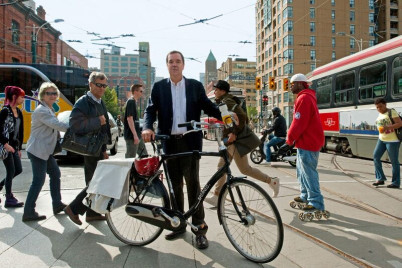What if walking, bicycling and public transport, instead of roads and highways, were at the heart of urban life? What if we started evaluating our cities based on a simple “8 80” rule: ensuring the safety and joy of children and older adults (from 8 year olds to 80 year olds) are at the forefront of our decision-making? How can we improve the quality of life for people of all ages amidst large demographic shifts? Gil Penalosa and Caroline Shaw talked about these questions at our seminar, now on video.
Age friendly cities and walkability by Gil Penalosa
Benchmarking cycling and walking in six New Zealand cities by Caroline Shaw
Caroline Shaw presented results from the recently completed report Benchmarking cycling and walking in six New Zealand cities: Pilot study 2015. This compares the infrastructure, funding and policies to promote walking and cycling of our largest cities and the rates of cycling and walking, safety and health of their inhabitants.
Speakers
- Gil Penalosa is the founder of the internationally recognised non-profit organisation 8 80 Cities, based in Canada. The organisation is based on a simple but powerful philosophy: if you create a great city for an 8 year old and an 80 year old, you will create a successful city for all people. In the 1990s Gil led the transformation of Bogota’s park system as Commissioner including the design and development of over 200 parks including Simon Bolivar, a 113 hectare park in the heart of the city. Gil’s team also initiated the “new Ciclovia”/ Open Streets – a programme that sees over 1.3 million people walk, run, skate and bike along 121 kilometres of Bogotá’s city roads every Sunday and today is internationally recognised and emulated. Gil is chair of the board of World Urban Parks, he also works for the renowned Danish firm Gehl Architects as an urban expert on mobility and citizen engagement and serves as senior advisor to Children & Nature Network, StreetFilms and America Walks.
- Caroline Shaw is a public health medicine specialist and epidemiologist at the Department of Public Health, University of Otago Wellington. She researches how good transport policies can improve health, the environment and the economy, as well as create dynamic and enjoyable places to live. Caroline is also interested in the interface between policy and epidemiology and has undertaken research in the ethnic and socio-economic determinants of health, cancer control, population screening and obesity prevention.

This was a joint event between NZ Centre for Sustainable Cities, Wellington City Council and Living Streets Aotearoa held on 5 July 2016.